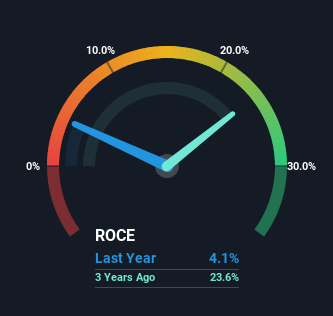- China
- /
- Metals and Mining
- /
- SHSE:601388
Yechiu Metal Recycling (China) (SHSE:601388) Could Be Struggling To Allocate Capital
If you're not sure where to start when looking for the next multi-bagger, there are a few key trends you should keep an eye out for. Typically, we'll want to notice a trend of growing return on capital employed (ROCE) and alongside that, an expanding base of capital employed. Ultimately, this demonstrates that it's a business that is reinvesting profits at increasing rates of return. Having said that, from a first glance at Yechiu Metal Recycling (China) (SHSE:601388) we aren't jumping out of our chairs at how returns are trending, but let's have a deeper look.
What Is Return On Capital Employed (ROCE)?
For those that aren't sure what ROCE is, it measures the amount of pre-tax profits a company can generate from the capital employed in its business. The formula for this calculation on Yechiu Metal Recycling (China) is:
Return on Capital Employed = Earnings Before Interest and Tax (EBIT) ÷ (Total Assets - Current Liabilities)
0.041 = CN¥196m ÷ (CN¥6.1b - CN¥1.3b) (Based on the trailing twelve months to June 2024).
Thus, Yechiu Metal Recycling (China) has an ROCE of 4.1%. Ultimately, that's a low return and it under-performs the Metals and Mining industry average of 7.0%.
Check out our latest analysis for Yechiu Metal Recycling (China)

In the above chart we have measured Yechiu Metal Recycling (China)'s prior ROCE against its prior performance, but the future is arguably more important. If you're interested, you can view the analysts predictions in our free analyst report for Yechiu Metal Recycling (China) .
How Are Returns Trending?
When we looked at the ROCE trend at Yechiu Metal Recycling (China), we didn't gain much confidence. Over the last five years, returns on capital have decreased to 4.1% from 6.0% five years ago. Meanwhile, the business is utilizing more capital but this hasn't moved the needle much in terms of sales in the past 12 months, so this could reflect longer term investments. It's worth keeping an eye on the company's earnings from here on to see if these investments do end up contributing to the bottom line.
On a side note, Yechiu Metal Recycling (China) has done well to pay down its current liabilities to 21% of total assets. So we could link some of this to the decrease in ROCE. Effectively this means their suppliers or short-term creditors are funding less of the business, which reduces some elements of risk. Since the business is basically funding more of its operations with it's own money, you could argue this has made the business less efficient at generating ROCE.
The Key Takeaway
Bringing it all together, while we're somewhat encouraged by Yechiu Metal Recycling (China)'s reinvestment in its own business, we're aware that returns are shrinking. And with the stock having returned a mere 28% in the last five years to shareholders, you could argue that they're aware of these lackluster trends. Therefore, if you're looking for a multi-bagger, we'd propose looking at other options.
If you want to continue researching Yechiu Metal Recycling (China), you might be interested to know about the 1 warning sign that our analysis has discovered.
While Yechiu Metal Recycling (China) isn't earning the highest return, check out this free list of companies that are earning high returns on equity with solid balance sheets.
New: Manage All Your Stock Portfolios in One Place
We've created the ultimate portfolio companion for stock investors, and it's free.
• Connect an unlimited number of Portfolios and see your total in one currency
• Be alerted to new Warning Signs or Risks via email or mobile
• Track the Fair Value of your stocks
Have feedback on this article? Concerned about the content? Get in touch with us directly. Alternatively, email editorial-team (at) simplywallst.com.
This article by Simply Wall St is general in nature. We provide commentary based on historical data and analyst forecasts only using an unbiased methodology and our articles are not intended to be financial advice. It does not constitute a recommendation to buy or sell any stock, and does not take account of your objectives, or your financial situation. We aim to bring you long-term focused analysis driven by fundamental data. Note that our analysis may not factor in the latest price-sensitive company announcements or qualitative material. Simply Wall St has no position in any stocks mentioned.
About SHSE:601388
Yechiu Metal Recycling (China)
Engages in aluminum alloy recycling business in Asia and the United States.
Adequate balance sheet and slightly overvalued.
Market Insights
Community Narratives





